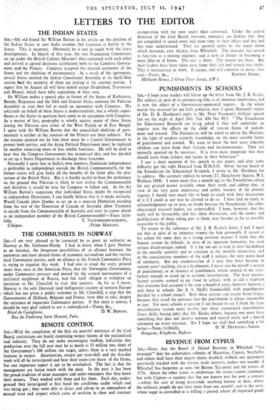PUNISHMENTS IN SCHOOLS
Stn,—I hope your readers will follow up the letter from Mr. J. R. Eccles. His subject, in spite of its unimposing title, is of immense importance, and is now the object of a Government-sponsored inquiry. As the whole matter has received far too little publicity, may I quote Hansard's report of Mr. D. R. Hardman's reply to Mr. Peter Freeman's brilliant speech late on the night of April 24th (Vol. 436 No. 91)? "The Foundation for Educational Research are being asked if they will undertake an inquiry into the effects on the child of various forms of punish- ment and reward. The Foundation will be asked to advise the Minister, in the light of modern scientific knowledge, on the most suitable forms of punishment and reward. We want to know the best ways whereby children can learn from their failures and misdemeanours. They are normally spurred on by successes. It is even more important that they should learn from failures and lapses in their behaviour."
I saw a short mention of this speech in one paper, and after some difficulty got the right Hansard from H.M.S.O. Never having heard of the Foundation for Educational Research, I wrote to Mr. Hardman for its address. His secretary replied by return (17, Manchester Square, W.1, Welbeck 1919). I wrote more than a month ago to the Foundation asking for any printed matter available about their work, and adding that, in view of the very great importance and public interest of the present inquiry, I should very much like to keep in touch with their discussions of it if I could in any way be allowed to do so. I have had no reply or acknowledgement up to new, no doubt because the Foundation, like other educational research bodies., are understaffed. I hope, however, that the reply will be favourable, and that these discussions, and the names and qualifications of those taking part in them, may become as far as possible accessible to the public.
To return to the substance of Mr. J. R. Eccles letter, I feel I must say that in spite of an immense respect for him personally (I staved at his school for some days as a young assistant master) I think that the honour system he defends, in spite of its apparent humanity, has very serious disadvantages indeed. It is far too apt to lead to later breakdown in the morally sensitive and to cynicism in the morally insensitive, and in the conscientious members of the staff it induces the very worst kind of solemnity. But my condemnation of it may lose force because in sixteen years' teaching, six as a headmaster, I never saw for myself a system of punishment, or of absence of punishment, which seemed to me satis- factory enough to stand up to accurate investigation. The least unsatis- factory systems seemed to me those in schools with so old a tradition that everyone had accepted it for over a hundred years, however fantastic ; and those in schools like A. S. Neill's Summerhill, with punishments decided by a school council. Both these systems can escape being bogus, because they avoid the pretence that the punishment is always reasonable or just. For most schools at present I am bound to say I think the least unsatisfactory system must involve just those stereotyped punishments (lines, drills, boring jobs) that Mr. Eccles abhors, because one must have something that does not involve nervous and mental strain and a horrid solemnity on every occasion. But I hope we shall find something a lot


































 Previous page
Previous page